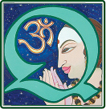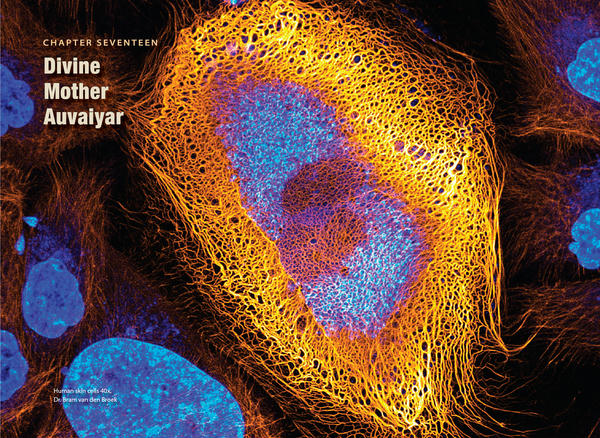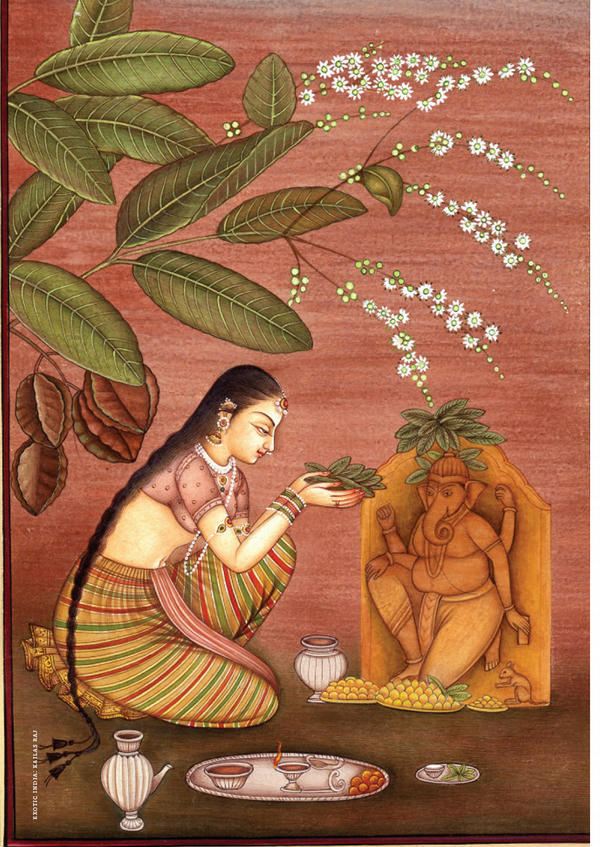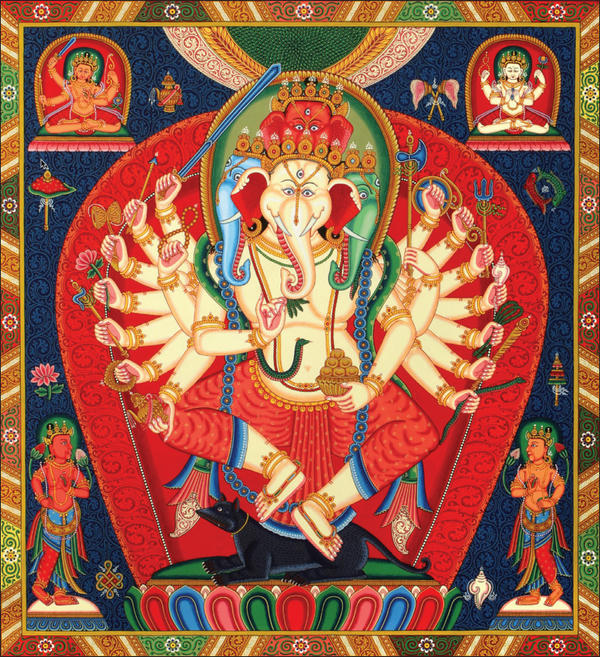Divine Mother Auvaiyar§
Sādhvī Auvaiyār Mā§
साध्वी औवैयार् मा§
 UITE A LONG TIME AGO, IN THE NINTH CENTURY, THERE LIVED IN THE South Indian Tamil land a woman saint known as Auvai or Auvaiyar, a Tamil appellation for a respected senior mother or lady. Abandoned by her parents at birth, Auvaiyar was raised by a family of Panars, who were wandering minstrels. As a young girl, she was deeply devoted to religion and literary pursuits and wanted to serve the people. Known for her intelligence and extraordinary beauty, she had many aristocratic suitors, and in time pressure was brought to bear for arranging her marriage. While most young women would welcome such attention, it was for Auvaiyar more threat than opportunity. Her interests were philosophical and devotional, and her life revolved around her love of Śiva. She did not want to make a man the center of that universe. Faced with the impending marriage that her family would surely arrange, Auvaiyar wept and prayed before her chosen Deity, Vighneśvara, to save her from this fate: “O my Lord, these people are only after my youth and beauty; but I want to dedicate myself to the Goddess of learning and to the spread of learning. Please take away my youth and my beauty so that I can have peace and follow my chosen way of life.” Gaṇeśa heard her prayer, and in the days that followed her skin wrinkled, hair grayed, eyes dulled, limbs stiffened and breasts sagged. Looking at her reflection in the village well, the maiden was overcome with joy, knowing she was now safe from the world, knowing that her loving Gaṇeśa had graciously answered her prayers.§
UITE A LONG TIME AGO, IN THE NINTH CENTURY, THERE LIVED IN THE South Indian Tamil land a woman saint known as Auvai or Auvaiyar, a Tamil appellation for a respected senior mother or lady. Abandoned by her parents at birth, Auvaiyar was raised by a family of Panars, who were wandering minstrels. As a young girl, she was deeply devoted to religion and literary pursuits and wanted to serve the people. Known for her intelligence and extraordinary beauty, she had many aristocratic suitors, and in time pressure was brought to bear for arranging her marriage. While most young women would welcome such attention, it was for Auvaiyar more threat than opportunity. Her interests were philosophical and devotional, and her life revolved around her love of Śiva. She did not want to make a man the center of that universe. Faced with the impending marriage that her family would surely arrange, Auvaiyar wept and prayed before her chosen Deity, Vighneśvara, to save her from this fate: “O my Lord, these people are only after my youth and beauty; but I want to dedicate myself to the Goddess of learning and to the spread of learning. Please take away my youth and my beauty so that I can have peace and follow my chosen way of life.” Gaṇeśa heard her prayer, and in the days that followed her skin wrinkled, hair grayed, eyes dulled, limbs stiffened and breasts sagged. Looking at her reflection in the village well, the maiden was overcome with joy, knowing she was now safe from the world, knowing that her loving Gaṇeśa had graciously answered her prayers.§
Auvaiyar left the shelter of home, where most people find security, and wandered far and wide in the palmyra-covered Tamil kingdoms of Chola, Pāṇḍya and Chera. Her life was simple, dedicated to the practice of yoga and to following her guru’s instructions. As her spiritual sādhana bore fruit, she slowly matured into spreading the tantras, the mystical teachings of the siddhars, the wisdom of God Śiva and the Gods. Her innumerable literary and philosophical works, for both children and elders, cover the entire gamut of human experience and testify to her profound wisdom. Her royal benefactors, among whom were Sri Sri Sri Adiyaman, Pari, Kari and Seraman, are historical figures distinguished by their bravery and benevolence. These mahārājas patronized her cultural works so that her fame spread far and wide. She is now acclaimed as the wisest woman of all ages in the chronicles of Indian culture.§
Auvaiyar Ma was a contemporary and close associate of two noble Śiva bhaktas, Saint Sundarar and Seraman Perumal, ruler of the Chera kingdom, both extolled as great Śaiva saints in Sekkilar’s epic hagiography, the Periyapuranam. One day, near the end of her life, it is said that Auvaiyar was in the midst of her daily worship of her beloved Gaṇeśa. She had a vision in which Saint Sundarar was proceeding to Mount Kailāsa, Śiva’s abode, with his comrade, King Seraman. Sundarar was riding a white elephant, and Seraman was on a white horse. They were as aware of her as she was of them. She became disturbed and tried to rush her worship, filled with a yearning to join her spiritual friends on their last journey. But Lord Gaṇeśa appeared and told her to finish her rituals calmly and without haste, with the promise that she would be taken to Kailāsa ahead of her two friends. Thereupon she entered her trance even more deeply and sang the renowned hymn of praise entitled Vināyaka Ahaval. (This great song of religious devotion to Gaṇeśa is sung to this day throughout the Tamil land at the time of Gaṇeśa worship, particularly during the annual Gaṇeśa Chaturthī festival.) As she finished her worship and placed the sacramental offering at His gracious feet, Vināyaka appeared before her, lifted her in His gentle trunk and delivered her to the Śivaloka, to Mount Kailāsa, before the two friends arrived. When Seraman Perumal inquired how it was that she had arrived ahead of them, she sang this in her unique and charming Tamil:§
O king, is there anything unattainable§
To them who intensely contemplate§
On the fragrant feet of the son§
Of Ummaiyal, of sweet and comely speech?§
The thunderous thud of the swift elephant§
And that of the agile horse must give place§
To that of the rider of this old dame!§
He is none other than the mighty Mahāgaṇapati.§
Vināyaka Ahaval
Adoration to the Remover of Obstacles§
Translated from Tamil by Tiru K. Swaminathan
(From Oṁ Gaṇeśa, the Peace of God)§
Cool, fragrant lotus feet§
with anklets tinkling sweet,§
gold girdle, flower-soft garment§
setting off the comely hips,§
pot belly and big, heavy tusk,§
elephant face with the bright red mark,§
five hands, the goad, the noose,§
blue body dwelling in the heart,§
pendulous jaws, four mighty shoulders,§
three eyes and the three required marks,§
two ears, the gold crown gleaming,§
the breast aglow with the triple thread,§
O Being, bright and beautiful!§
Wish-yielding elephant, born of the§
Master of Mystery in Mount Kailāsa,§
mouse rider, fond of the three famed fruits,§
desiring to make me yours this instant,§
you like a mother have appeared before me§
and cut the delusion of unending births.§
You have come and entered my heart,§
imprinting clear the five prime letters,§
set foot in the world in the form of a guru,§
declared the final truth is this, gladly,§
graciously shown the way of life unfading.§
With that unfailing weapon, your glance,§
you have put an end to my heinous sins,§
poured in my ear uncloying precepts,§
laid bare for me the clarity§
of ever-fresh awareness,§
sweetly given me your sweet grace§
for firm control of the senses five,§
taught how to still the organs of action;§
snapped my two-fold karma and dispelled§
my darkness, giving, out of grace,§
a place for me in all four states;§
dissolved the illusion of triple filth,§
taught me how to shut the five§
sense gates of the nine-door temple,§
fixed me firm in the six yogic centers,§
stilled my speech, taught me§
the writ of iḍā and piṅgalā,§
shown me at last the head of sushumṇā.§
To the tongue of the serpent that sinks and soars§
you have brought the force sustaining the three§
bright spheres of sun, moon and fire—§
the mantra unspoken asleep in the snake—§
and explicitly uttered it;§
imparted the skill of raising by breath§
the raging flame of mūlādhāra;§
explained the secret of immortality,§
the sun’s movement and the charm§
of the moon; the water lily’s friend,§
the sixteen states of the prasāda mantra;§
revealed to me in thoughtful wisdom§
the six-faced form and the meanings four;§
disclosed to me the subtle body§
and the eight separate modes of being;§
the orifice of Brahman opened,§
giving me miraculous powers,§
by your sweet grace, and mukti, too;§
revealed my Self to me and by your grace§
swept away accumulated karma,§
stilled my mind in tranquil calm§
beyond speech and thought;§
clarified my intellect, plunged me§
in bliss which is the common ground§
of light and darkness.§
Boundless beatitude you have given me,§
ended all affliction, shown the way of grace:§
Śiva eternal at the core of sound,§
Śivaliṅga within the heart,§
atom within atom, vast beyond all vastness,§
sweetness hid in the hardened node.§
You have steadied me clear in human form§
all besmeared with holy ashes;§
added me to the congregation§
of your servants true and trusty;§
made me experience in my heart§
the inmost meaning of the five letters;§
restored my real state to me;§
and rule me now, O Master of Wisdom,§
Vināyaka. Your feet alone,§
O Master of Wisdom, Vināyaka,§
your feet alone, are my sole refuge.§



